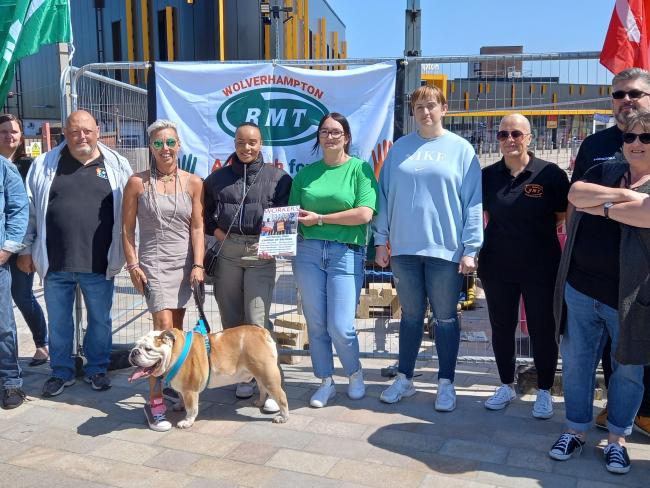22 October 2024

RMT pickets, Wolverhampton, May 2023. Photo Workers.
Rail workers in most train operating companies – members of RMT, TSSA and Unite – have voted to accept the national pay deal that brings to an end a period of intermittent strikes and other industrial action over more than two years.
The deal gives a 4.75 per cent increase for 2023, and a 4.5 per cent increase for 2024. This follows the acceptance of a similar national offer to most train drivers to settle their separate dispute.
Determined
And in both cases, the new Labour government dropped its predecessor’s insistence that pay increases must be coupled to bringing in highly unpalatable changes to terms and conditions. Those proposed conditions had met with determined opposition from all the unions, which was not going to be dropped after the election.
Despite the strikes and the disruption arising from the long-running disputes, passenger numbers have continued to climb after the end of the pandemic. The return of more stable industrial relations in the railway industry is likely to see even more passengers.
Investment need
Growth in passenger numbers highlights the need for much more investment in capacity, as well as in quality and reliability. Following pressure from those in the rail industry, particularly the rail unions, the Chancellor of the Exchequer, Rachel Reeves, seems to have bowed to the inevitable and accepted the need for investment in capacity.
Reeves has strongly hinted that HS2 will after all be built all the way to Euston in London, and that the cancelled HS2 link to relieve Crewe will be reinstated.
Challenge
The challenge from now on for rail workers is to continue to press for much needed investment, particularly in electrification and new trains. There’s a need not only to replace the current aging fleet but also to increase the total number of seats available.
‘Unions must face down pressure to lower pay and conditions.’
At the same time rail workers will have to deal with other challenges arising as train operators and Network Rail are integrated under common public ownership under Great British Railways. Unions must be ready to face down inevitable pressures to harmonise downwards to the lowest standards of pay and conditions.
With pay disputes breaking out in publicly-owned Transport for Wales and recent pay disputes in Scotrail, rail workers are clear in practice that public ownership is no panacea. Pay, conditions and the future of the industry all have to be fought for.
• A shorter, edited version of this article appears in the November/December issue of Workers magazine.
